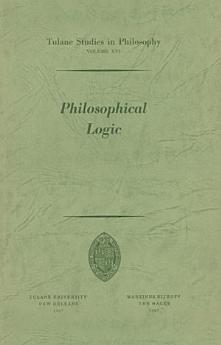Philosophical Logic
Robert L. Arrington · Peter M. Burkholder · Shannon Dubose · James W. Dye · James K. Feibleman · Bertrand P. Helm · Max Hocutt · Harold N. Lee · Louise N. Roberts · John C. Sallis · Donald H. Weiss
сне 2012 · Tulane Studies in Philosophy Кніга 16 · Springer Science & Business Media
Электронная кніга
162
Старонкі
reportАцэнкі і водгукі не спраўджаны Даведацца больш
Пра гэту электронную кнігу
With this issue we initiate the policy of expanding the scope of Tulane Studies in Philosophy to include, in addition to the work of members of the department, contributions from philosophers who have earned advanced degrees from Tulane and who are now teaching in other colleges and universities. The Editor THE LOGIC OF OUR LANGUAGE ROBERT L. ARRINGTON Wittgenstein wrote in the Tractatus that "logic is not a body of doctrine, but a mirror-image of the world. " 1 In line with his suggestion that a proposition is a 'picture', Wittgenstein argued that propositions 'show' the logical structure of the real. He was insistent, however, that "the apparent logical form of a proposition need not be its real one. " 2 As a result of this we can misunderstand the structure of fact. Philosophical problems arise just when "the logic of our language is mis understood. " 3 It is common knowledge that much of this view of logic was rejected by Wittgenstein himself in the Philosophical Investi gations. There we are told that language has no ideal or sublime 4 logic which mirrors the structure of the extra-linguistic world. Consequently, inferences from the structure of language to the structure of that extra-linguistic world are invalid. Reality can be 'cut up' in any of a number of ways by language. Wittgenstein adopted a view of philosophy which would render that discipline a non-explanatory, non-critical study of the multiple ways in which language can be used.
Звесткі пра аўтара
Born in New Orleans, Louisiana, in 1904, James Feibleman is a prolific author who has published nearly 50 books of poetry, novels, autobiography, but mostly serious philosophy. He attended the University of Virginia for several years, but did not graduate. From 1925 to 1929, Feibleman was the assistant manager of a department store. He then resumed his education in Europe during the 1930s. During World War II, Feibleman was a professor of English at Tulane University, later becoming chair of the department of philosophy from 1952 to 1969. His major endeavor was formulating a system of philosophy that rested on the ontological foundations of realism harking back to Plato the idea that there is an a priori argument for existence but that incorporated modern science. The outline of Feibleman's system was expounded in his massive Ontology (1951) but was elaborated in a number of volumes in special areas such as aesthetics, ethics, political philosophy, and legal philosophy. Feibleman also published several books on popular philosophy. In addition to his active career in philosophy, Feibleman was a successful businessman. From 1930 until 1954, he was vice president and general manager of James K. Feibleman Realty Company. He was a major partner in the Leopold Investment Company (1954-1971).
Donald H. Weiss, Ph.D., is president of Self-Management Communications, Inc. and has been a training and development executive and consultant for more than 30 years. In addition to consulting work, he has held management positions with Citicorp, Millers Mutual Insurance, and Equitable. He has many books include the first two editions of Fair, Square & Legal, Why Didn't I Say That?, Secrets of the Wild Goose, and The Self-Management Workshop: A Trainer's Guide. He lives in the St. Louis area.
Ацаніце гэту электронную кнігу
Падзяліцеся сваімі меркаваннямі.
Чытанне інфармацыb
Смартфоны і планшэты
Усталюйце праграму "Кнігі Google Play" для Android і iPad/iPhone. Яна аўтаматычна сінхранізуецца з вашым уліковым запісам і дазваляе чытаць у інтэрнэце або па-за сеткай, дзе б вы ні былі.
Ноўтбукі і камп’ютары
У вэб-браўзеры камп’ютара можна слухаць аўдыякнігі, купленыя ў Google Play.
Электронныя кнiгi i iншыя прылады
Каб чытаць на такіх прыладах для электронных кніг, як, напрыклад, Kobo, трэба спампаваць файл і перанесці яго на сваю прыладу. Выканайце падрабязныя інструкцыі, прыведзеныя ў Даведачным цэнтры, каб перанесці файлы на прылады, якія падтрымліваюцца.







